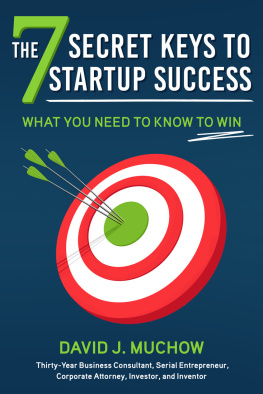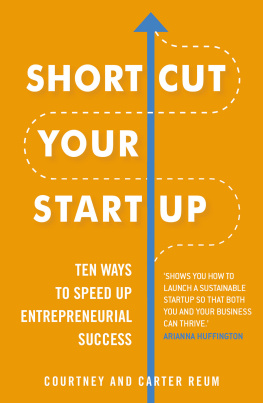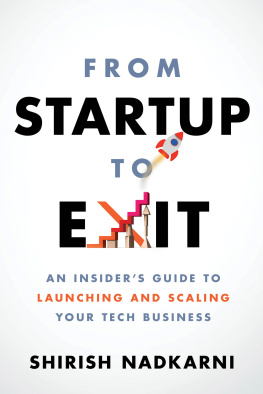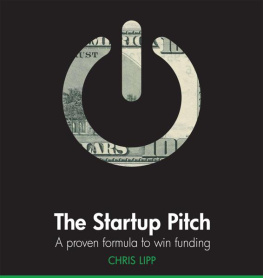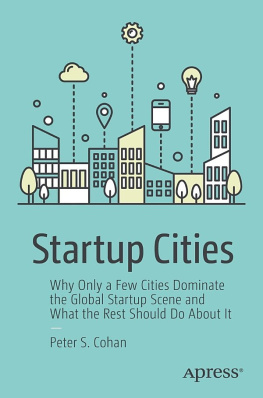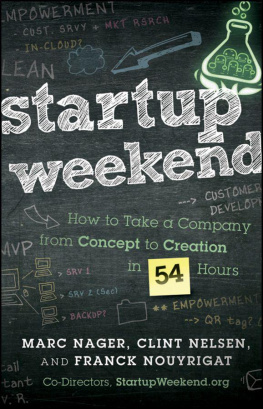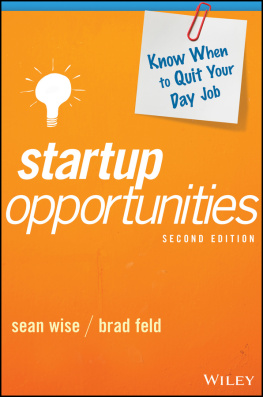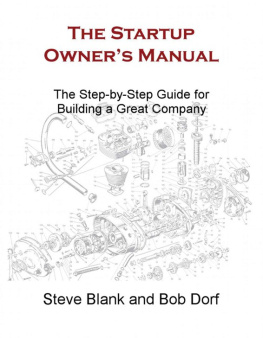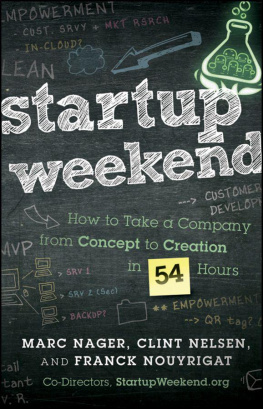Copyright2012 by Startup Weekend. All rights reserved.
Published by John Wiley & Sons, Inc., Hoboken, New Jersey.
Published simultaneously in Canada.
No part of this publication may be reproduced, stored in a retrieval system, or transmitted in any form or by any means, electronic, mechanical, photocopying, recording, scanning, or otherwise, except as permitted under Section 107 or 108 of the 1976 United States Copyright Act, without either the prior written permission of the Publisher, or authorization through payment of the appropriate per-copy fee to the Copyright Clearance Center, Inc., 222 Rosewood Drive, Danvers, MA 01923, (978) 750-8400, fax (978) 646-8600, or on the web at www.copyright.com . Requests to the Publisher for permission should be addressed to the Permissions Department, John Wiley & Sons, Inc., 111 River Street, Hoboken, NJ 07030, (201) 748-6011, fax (201) 748-6008, or online at http://www.wiley.com/go/permissions .
Limit of Liability/Disclaimer of Warranty: While the publisher and author have used their best efforts in preparing this book, they make no representations or warranties with respect to the accuracy or completeness of the contents of this book and specifically disclaim any implied warranties of merchantability or fitness for a particular purpose. No warranty may be created or extended by sales representatives or written sales materials. The advice and strategies contained herein may not be suitable for your situation. You should consult with a professional where appropriate. Neither the publisher nor author shall be liable for any loss of profit or any other commercial damages, including but not limited to special, incidental, consequential, or other damages.
For general information on our other products and services or for technical support, please contact our Customer Care Department within the United States at (800) 762-2974, outside the United States at (317) 572-3993 or fax (317) 572-4002.
Wiley publishes in a variety of print and electronic formats and by print-on-demand. Some material included with standard print versions of this book may not be included in e-books or in print-on-demand. If this book refers to media such as a CD or DVD that is not included in the version you purchased, you may download this material at http://booksupport.wiley.com . For more information about Wiley products, visit www.wiley.com .
Library of Congress Cataloging-in-Publication Data:
Nager, Marc, 1985
Startup Weekend: how to take a company from concept to creation in 54 hours / Marc Nager, Clint Nelsen & Franck Nouyrigat.
p. cm.
ISBN: 978-1-118-10509-2 (cloth)
ISBN: 978-1-118-15963-7 (ebk)
ISBN: 978-1-118-16023-7 (ebk)
ISBN: 978-1-118-16024-4 (ebk)
1. New business enterprises. I. Nelsen, Clint. II. Nouyrigat, Franck. III. Title.
HD62.5. N335
658.1 '1-dc23
2011024064
This book is dedicated to entrepreneurs.
Because of you, the world is a better place.
Foreword
Carl Schramm and Steve Blank
The Art and Science of Startups in Revolutionary Times
In the future, we will look back at this decade (2010 to 2020) as the beginning of an economic revolution as significant and world-changing as the Scientific Revolution of the sixteenth century and the Industrial Revolution of the eighteenth century. We are currently standing at the beginning of the entrepreneurial revolution. This doesn't mean just more technology-based products (though we'll certainly get our share of those). Rather, this is a revolution that will permanently reshape business as we know it, and more importantly, change the quality of life across the entire planet for all who come after us. And organizations like Startup Weekend are at the very forefront of this groundbreaking development.
The Barriers to Entrepreneurship
Over the past 40 years, startups continued to innovate as each new wave of technology took hold. However, the rate of innovation was constrained by limitations we are just beginning to understand. Only in the past few years have we come to appreciate the fact that startups in the past were constrained by factors like:
Long technology development cycles (how long it takes to get from idea to product).
The high cost of getting to first customers (the cost to build the product).
The structure of the venture capital industry (that there were a limited number of venture capital firms, each of which needed to invest millions per startup).
The expertise about how to build startups (which was clustered in specific regions like Silicon Valley, Boston, and New York).
The failure rate of new ventures (startups had no formal rules, and were frequently hit or miss propositions).
The slow adoption rate of new technologies by governments and large companies.
Fortunately for us, many of these elements have changed drastically in recent years. Not only are technology cycles speeding up and the cost of getting products to customers decreasing, but organizations like Startup Weekend are pushing knowledge and networks to greater numbers of entrepreneurs.
The Democratization of Entrepreneurship
What's happening is something more profound than a change in technology; the change is in the fact that the many inhibitors and limitations to startups and innovation are being removed. All at once, starting now.
Compressing the Product Development Cycle: In the past, the time to build a first product release was measured in months or even years, as startups took time to execute the founder's vision of what customers wanted. This meant that they built virtually every possible feature the founding team envisioned into a monolithic release of the product. Yet time after time, startups would find that customers didn't use or want most of the features after the product shipped. The founders were simply wrong in their assumptions about customer needs, and they wasted considerable effort developing all those unused features.
Fortunately, today's startups have begun to create products differently. Instead of building the maximum number of features they can imagine, they look to deliver a minimum feature set in the shortest period. This lets them launch a first version of the product to customers in a fraction on the time. In fact, for products that are simply bits delivered over the web, a first product can be shipped in weeks rather than years .
Startups Built for Thousands Rather than Millions of Dollars: Startups traditionally required millions of dollars of funding just to get their first product to customers. For instance, a company that developed software would have to buy computers and license software from other companies and hire the staff to run and maintain it. A hardware startup had to spend money building prototypes and equipping a factory to manufacture the product.
Today, open source software has slashed the cost of software development from millions of dollars to thousands. No consumer hardware startup has to build their own factory, as the costs are absorbed by offshore manufacturers. And the cost of getting the first product out the door for an Internet commerce startup has dropped by a factor of 10 or more in the last decade.
The New Structure of the Venture Capital Industry: The plummeting cost of getting a first product to market, particularly for Internet startups, has shaken up the venture capital industry. Venture capital used to be a tight club clustered around formal firms located in areas like Silicon Valley, Boston, and New York. While those firms are still there and growing, the pool of money that invests risk capital in startups has expanded, and a new class of investors has emerged. New groups of VCs called super angels , which are generally smaller than the traditional multihundred-million-dollar VC fund, can make the small investments necessary to help launch a consumer Internet startup. These angels make lots of early bets and double-down when early results appear. And the results do appear years earlier than they would in a traditional startup.


